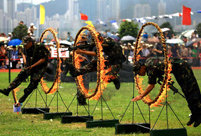 Vintage cars show kicks off in London
Vintage cars show kicks off in London
 Gorgeous scenery in NE China
Gorgeous scenery in NE China
 Picturesque Barkol grassland in Xinjiang
Picturesque Barkol grassland in Xinjiang
 Small Wild Goose Pagoda - A World Cultural Heritage Site along the Silk Road
Small Wild Goose Pagoda - A World Cultural Heritage Site along the Silk Road
 Maritime Silk Road Luxuries of the Han Dynasty
Maritime Silk Road Luxuries of the Han Dynasty
 Ciao! Chinese beauties!
Ciao! Chinese beauties!
 An eye feast: BFA freshmen registration
An eye feast: BFA freshmen registration
 Top 10 most lavish weddings
Top 10 most lavish weddings
 Most amazing chi-pao beauties
Most amazing chi-pao beauties
 Chinese lingerie brand arrives in Las Vegas
Chinese lingerie brand arrives in Las Vegas
Editor's Note:
Since the idea of building a new type of major power relationship was raised during Chinese President Xi Jinping's Annenberg meeting with his US counterpart Barack Obama in June 2013, the most important bilateral relationship in the world has gone through another round of changes. Whether China and the US can avoid the "Thucydides Trap" is an issue of concern for both sides. In a forum themed around "China and Global Governance" held Friday by the School of International Studies, Peking University, four Chinese scholars reviewed Sino-US relationship one year after the concept was created.
Yang Yi, rear admiral of the PLA Navy
The China-US relationship isn't developing in a synchronized fashion in the spheres of politics, security, economy, and culture. The security relationship lags behind other fields.
The unusual scenario we are in is that as the most powerful military power and a country with fastest rising military ability, the US and China are both trying to ultimately avoid military confrontation, yet both are prepared for a war with each other in the worst case scenario.
The US "pivot to Asia" strategy, though it has its logic from Washington's perspective, has increased the uncertainties of Sino-US ties.
From China's perspective, the policy has destabilized the region. The US has repeatedly said the pivot doesn't target China, but in Beijing's eyes, every move taken by the US is targeting China. The mutual misunderstanding is deepening.
Bilateral relations should avoid being hijacked by third parties. Candid communication on strategic intentions and other issues is necessary to deepen understanding.
In spite of the fragility, military engagements are increasing. China has taken part in the RIMPAC 2014 military exercise. Wu Shengli, commander of Chinese PLA Navy, has recently been in Newport, Rhode Island to attend the International Sea Power Symposium at the US Naval War College, the first time a Chinese navy commander has attended.
Jin Canrong, associate dean of the School of International Studies, Renmin University of China
At the sixth Strategic & Economic Dialogue held in Beijing in July, the two sides pledged to move forward negotiation of bilateral investment treaty, which if it goes well, can further promote mutual direct investment.
In the past four decades, economic and trade ties have undoubtedly been the ballast of Sino-US relationship. They are the major platform where future cooperation can be implemented.
Since 2011, China has started unifying tax treatment of domestic and overseas business entities. The super-national treatment enjoyed by foreign capital will be gradually eliminated.
It is a challenge to foreign investment in China, including investment from the US. Plus, the multilateral trade agreements two countries initiated outside the WTO framework, China's industrial upgrades, and internationalization of the yuan may form conflicts in the future economic and trade relationship between the two sides.
Da Wei, director of the Institute of American Studies, China Institutes of Contemporary International Relations
China first raised the concept of a new type of major power relationship at the beginning of 2012. The two countries reached an initial consensus of this concept during the Xi-Obama meeting in June 2013.
In the following more than one year, building a new type of major power relationship has made a little progress. At least, the US started acknowledging and using this terminology created by China, which has been rare in the decades of US-China engagement.
But there is still a large gap of perception toward this concept. Chinese officials in various occasions have elaborated it with three key points: no conflict or confrontation, mutual respect, and win-win cooperation. But from my observance, the US doesn't accept this package.
Take "no conflict or confrontation." The US would rather see it from the perspective of crisis management, while China emphasizes rooting out conflict and confrontation. Mutual respect is rejected by the US as it doesn't want to be trapped into making compromise on China's core interest. On win-win cooperation, the US generally agrees, but has different agendas and priorities to China.
Building a new type of major power relationship lacks theoretical support and the relevance of international relations theory. It needs to be further elaborated.
Jia Qingguo, professor and dean of the School of International Studies, Peking University
China and the US were foes in the past, and they aren't friends today. To be precise, they are rival competitors and cooperative partners at the same time.
The two countries confronted each other in the Korean War and Vietnam War. This enmity lasted until early 1970s, after which the process of reducing enmity started.
Four decades later, like the US, China is a stakeholder in the existing international order. China is not just a guardian and supporter, but also a reformer of the existing international relations.
China is seeking to improve market economy, rule of law, human rights and democracy according to its own national conditions.
China and the US are competing for efficiency in economy, striving for expanding influence in Asian politics, and both are seeking the maximum degree of security.
The most important is the competition of development model. The US still dominates in most fields.
The competition, if managed well, could propel the reform of domestic politics for both.
Benign cooperation on a wide spectrum of issues has laid the foundation for building a new type of major power relationship.
 Century-old public bath closes door in Beijing
Century-old public bath closes door in Beijing Military training in Hong Kong
Military training in Hong Kong Teahouses in Chongqing: Worship to the leisure lifestyle
Teahouses in Chongqing: Worship to the leisure lifestyle Giant white gourd weighing 87 kilograms appears in SE China
Giant white gourd weighing 87 kilograms appears in SE China Advanced arms help to safeguard China-ASEAN Expo
Advanced arms help to safeguard China-ASEAN Expo Leading director Wang Quan'an detained for 'buying sex'
Leading director Wang Quan'an detained for 'buying sex' Heaven on earth: Dongjiang Lake in Hunan
Heaven on earth: Dongjiang Lake in Hunan Mixed reaction to smartphone sidewalk
Mixed reaction to smartphone sidewalk Amazing aerial photos of China's Xisha Islands
Amazing aerial photos of China's Xisha Islands Lingerie show at 2014 Miss China
Lingerie show at 2014 Miss China Songstress Li Xianglan dies at 94
Songstress Li Xianglan dies at 94 Police recruiting posters
Police recruiting posters Anshun Daxi- Living fossil of Chinese drama
Anshun Daxi- Living fossil of Chinese drama Urban farmers in China
Urban farmers in China 'Firepower-2014 Weibei'military exercise
'Firepower-2014 Weibei'military exerciseDay|Week|Month